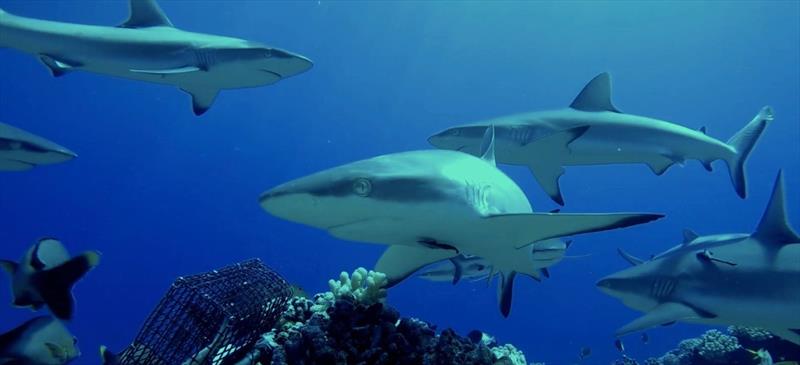
Reef shark conservation depends on a combination of protected areas & national fisheries management
by Mote Marine Laboratory & Aquarium 25 May 2024 14:35 UTC

New study finds global reef shark conservation depends on a combination of protected areas and national fisheries management © Mote Marine Laboratory & Aquarium
Marine protected areas (MPAs), areas that provide legal protection to important marine and coastal ecosystems, often have more reef sharks compared to non-protected areas, but according to a new study in Nature Ecology and Evolution by researchers of Curtin University, Mote Marine Laboratory, and others, finds that when MPAs are established in nations that also limit shark fishing through catch limits or gear restrictions, conservation benefits are doubled.
Based on the world's largest reef shark and ray survey, Global FinPrint, a project funded by The Paul G. Allen Family Foundation, these findings emphasize that nations should use both approaches (the use of MPAs and effective fisheries management) to rebuild reef shark populations, which have declined on average globally by 63%.
"Previous studies have shown that fully protected areas - that is MPAs where all fishing is prohibited - can benefit reef sharks. Our study adds a new element; nations can boost these benefits even further," said Dr. Jordan Goetze, the study's lead author, and Adjunct Research Fellow at Curtin University. "They can do so by applying restrictions on destructive fishing gear such as longlines and gillnets or limiting shark catches outside the protected areas. These actions reduce shark mortality across the whole nation and supercharge the effect of fully protected areas".
The study used baited underwater video stations (BRUVS), which are cameras placed in front of a bait source on a reef for 60 minutes. Global FinPrint amassed over 20,000 hours of video footage across 58 nations, which trained researchers scoured for reef sharks to identity population abundance of various species on reefs. Previous analyses of these data highlighted alarming trends: reef sharks were functionally extinct on close to 20% of surveyed reefs and there was an average global decline of 63% across five main reef shark species (grey reef, Caribbean reef, whitetip reef, blacktip reef, and nurse sharks).
Reef shark sightings were on average twice as common in fully protected areas than nearby fished areas, yet the team also found that many fully protected areas didn't provide any measurable benefits for reef sharks.
"We found that successful fully protected areas were large and protected whole reefs, not just parts of a reef. If designed correctly, MPAs could even be successful in areas of high human pressure," said Dr. Demian Chapman, Director of the Sharks and Rays Conservation Research Program and Lead Scientist of Global FinPrint.
Fully protected areas found to benefit reef sharks were located all over the world, including the U.S., Australia, Belize, Bahamas, Antigua and Barbuda, Cuba, Brazil, Indonesia, Malaysia, the Philippines, and Fiji.
The team compared reef shark sightings inside fully protected areas in nations that had fisheries management measures known to benefit reef sharks and in nations where shark fishing was not effectively controlled.
"It was clear that the best outcome for reef sharks occurred when nations used both fully protected areas and effective fisheries management together," said Dr. Goetze. "An advantage of national fisheries management is that it also likely benefits wide-ranging sharks like tigers and hammerheads that we showed didn't benefit from fully protected areas because they don't stay in on the coral reefs for as long as the reef sharks."
Reef sharks are iconic species that likely play an important role in coral reef ecology and in some areas benefit people as living tourism attractions. In some cultures, they are celebrated as embodiments of gods, guardians and protectors.
"Many nations are currently in the process of expanding their protected areas as part of the global 30 x 30 initiative, which aims to protect 30% of our oceans by 2030," said Dr. Chapman. "This study provides guidance on how nations can expand their protected areas in a way that benefits these ecologically, culturally, and economically important reef sharks. It also highlights that these protected area expansion efforts need to work with national fisheries management efforts to ensure the conservation of as many species of sharks as possible."